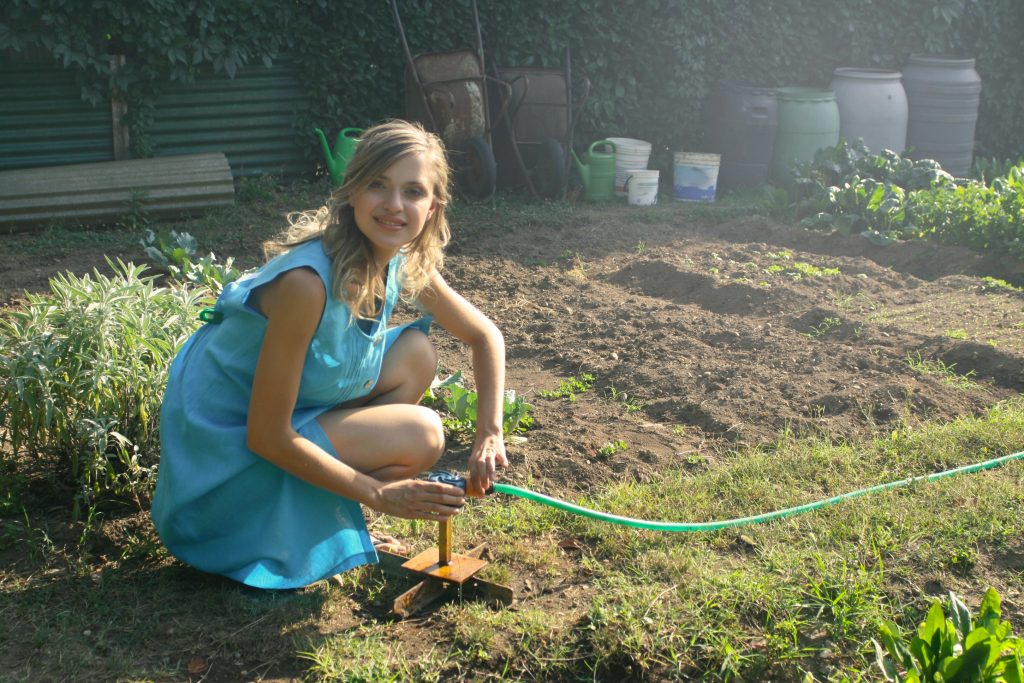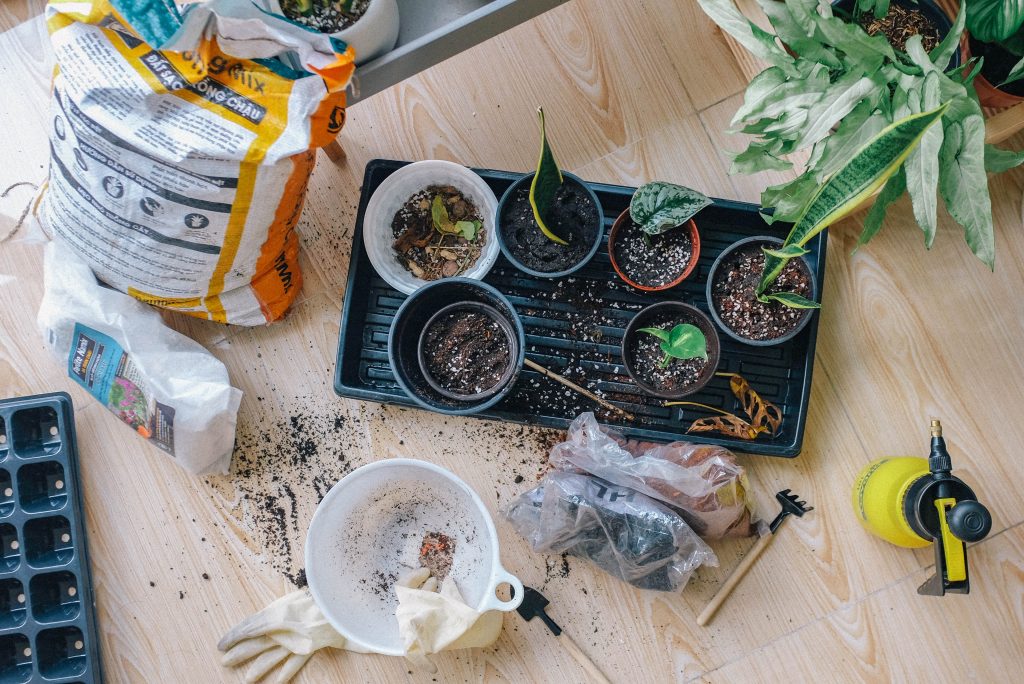Time to prepare Soil
We discuss many important points for beginning of gardening in the previous article, and I hope it will help you throughout your gardening journey.
Preparing the soil is a very crucial point of gardening with proper fertile soil dreaming of good gardening is useless, it’s very important to spend the time in preparing soil and improve its quality. Fertile land is surety for our healthy plants and have the best foundation possible to thrive. There are a few key points to keep in mind when preparing soil for gardening:
1. Prepare the soil with organic matter. This could be in the form of compost, manure, or other organic changes. This will help improve the soil structure and fertility. And what I do for my plants, I prepare one unique liquid, Like I collect skin (Rind) of different available vegetable and fruits, and add skin of egg, put it in water and boiled for 15 minutes, keep them and wait to come back in normal temperature, I irrigate my newly soil with this water, Its providing energy and very powerful for plants and tree, actually its consist of different vitamins, minerals, all that a hungry soil needed.

2. Add lime to the soil if needed. This is especially important if you’re growing vegetables, as they prefer a slightly acidic soil. You can test your soil’s pH level with a simple test kit from a gardening shop.
3. You must make sure the soil having the ability to drain water in a timely manner, If soil is unable to drain water, there are less chances healthy plants can grow, if soil is unable to drain water, you need to add some sand in it, its draining water problem can solve.
4. Please remember all these tasks you must complete 15 days before you start seeding, because soil requires to gather all required minerals and calcium pH level, if you do one or two days before planting or seeding, your germination process will delay unnecessarily.
Seeds Quality and selection process
Seed selection is like a coach selecting player for its team, without healthy seeds how can you expect healthy plants, there are many important points you should keep in mind before finalizing seeds.
First, you will want to make sure that the seeds are of good quality. But how can you be sure if you have no basic knowledge, so let me tell you.
This can be decided by looking at the seed packet or asking the person selling the seeds. Second, you will want to consider the selection process. There are two main types of seeds, heirloom and hybrid. Heirloom seeds are those that have been passed down from generation to generation and are usually open-pollinated, meaning they can be pollinated by insects or other means. Hybrid seeds are created by crossing two different types of plants, which results in a plant that is sterile and cannot produce viable seed. Finally, you will want to think about how you will store the seeds. Seeds should be stored in a cool, dry place until you are ready to plant them.
Another Important tip, what I did with my seeds before, I collect some ash,if you do not have ashes, you can prepare at home easily, jut burn some wood, or better skins of vegetables and fruit and eggs and mix with it seeds properly just one day before seeding, it will gives you better result in germination process and insects and ants will keep away from it.
First irrigation after seeding?
After successful seeding, the next most important step to irrigation or watering. At this stage, watering is as important as a first feed to the baby.
Here are some important tips for watering your seeds after seeding: -Water your garden in the morning so that the seedlings can benefit from the sunlight and warmth during the day.

-Use a gentle stream of water so that you do not disturb the delicate seedlings.
-Water regularly, making sure the soil stays wet but not soggy. Overwatering can harm seedlings just as easily as under watering. By following these tips, you will give your seedlings the best chance to grow in their new home.
Newly grown plant protection
Growing plants from seeds is quite a professional task in gardening, especially if you are new, its needing extra attention, make sure you protect your newly grown plants from insects and disease. How can you do that? There are certain frequent tasks you need to execute, like inspecting your plants regularly for pests and diseases. If you see any problems, take action immediately.
– Keep your garden clean and free of debris. This will help discourage pests and diseases. – Water your plants regularly, but don’t overdo it. Wet leaves are more susceptible to fungal diseases.
-Use mulch around your plants to help retain moisture and prevent weeds from competing for resources. By following these tips, you can help ensure that your newly grown plants stay healthy and grow continuously.
Newly grown plant protection medicine
Now it’s time to discuss newly grown plant protection with medicine or with organic methods. There are many different methods available, and each one has its own pros and cons. Here’s a quick guide to help you choose the best choice for your plants. Organic gardening is all about using natural methods to grow your plants. This means avoiding synthetic pesticides and fertilizers, as well as anything else that isn’t natural. Instead, organic gardeners trust products like compost, mulch, and beneficial insects to keep their plants healthy.
There are many different organic plant protection products on the market, so it’s important to do some research before choosing one. You’ll want to consider things like price, effectiveness, and safety before making a decision. Insecticidal soap is a popular choice for organic gardeners. It’s made from potassium salts and fatty acids, which work together to kill pests like aphids, mealybugs, whiteflies, and spider mites. Insecticidal soap is safe for humans and pets, but it can be harmful to bees, so be sure to use it sparingly around blooming plants. Neem oil is another popular option for organic gardeners. It comes from the neem tree, and it works by disrupting the life cycle of insects. Neem oil is safe for humans and animals, but it can be harmful to bees if used excessively. Pyrethrin is a botanical insecticide made from chrys.
I personally use Neem oil for plants. It really works fine and no harm to any one echo friendly, and the price is also very low; it works quickly and lasting. Neem oil for plant protection is easily available in herbal shops as well as in pesticide stores.
Sunshine for plant growth
Sunshine is very imperative for the plant’s growth. Absence or lack of sunshine may cause a delay in plant growth and sometimes even unable to produce flowers and fruit, so make sure the plant location has sufficient sunshine, if not, always start outdoor gardening where your plants can eat lots of sunshine. Are you laughing at eating sunshine? It is a reality that plants eat sunlight just like we eat food to get energy.
Plants care during fruiting and flowering
Now it’s time to receive your reward of hardworking in gardening, but be careful and alert; when your plants are flowering and producing fruit they need extra care. Inspect each plant individually for pests and diseases; if any pest or disease is found remove this plant immediately.
Here are some tips for caring for your plants during the fruiting and flowering stages:
– Inspect your plants regularly for pests and diseases. Treat any problems immediately.
– Water your plants regularly, especially during hot weather. Add mulch to help retain moisture.
– Feed your plants with a high-potassium fertilizer to encourage strong flowers and fruits. – Harvest vegetables regularly, as soon as they’re ready. Pick flowers regularly to encourage more blooms.
Irrigation strategy for your garden
Plants are hungry for water H2O, so it is very, very important, you know are exact requirements of your plants, do you think each plant needs equal requirements? No, each plant type needs a different type of water requirement and it also depends on what type of land, sandy soil has more water Plants are hungry for water; clay and solid soil need less water, and the types of plants will be different too. So plan before planting in the garden and check the availability of water near your garden type of water like salt water is like poison for plants and sweet drinkable water is good enough for plants.
Another main point that must be mentioned here is to avoid little watering to plants like minor showering each day; provide full water two times in summer and one time in winter.
So these are the key points here we discuss in a beginner’s guide to gardening. I hope you learn many key factors before starting planting and if you have any questions, please feel free to contact US or comment below we will be glad to answer your questions.
